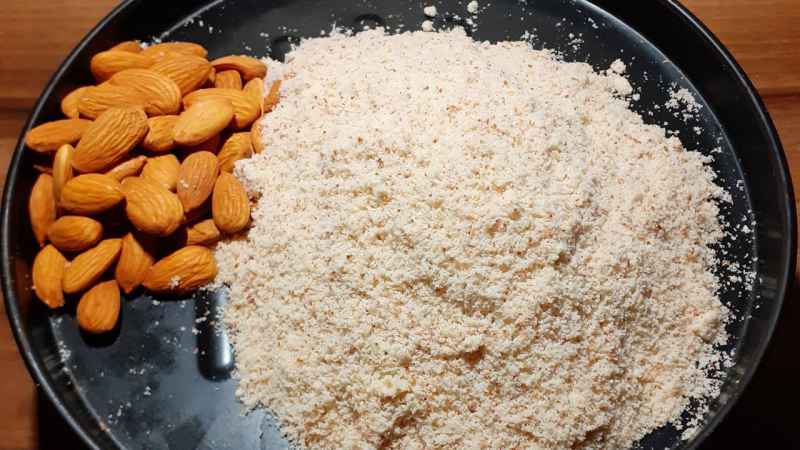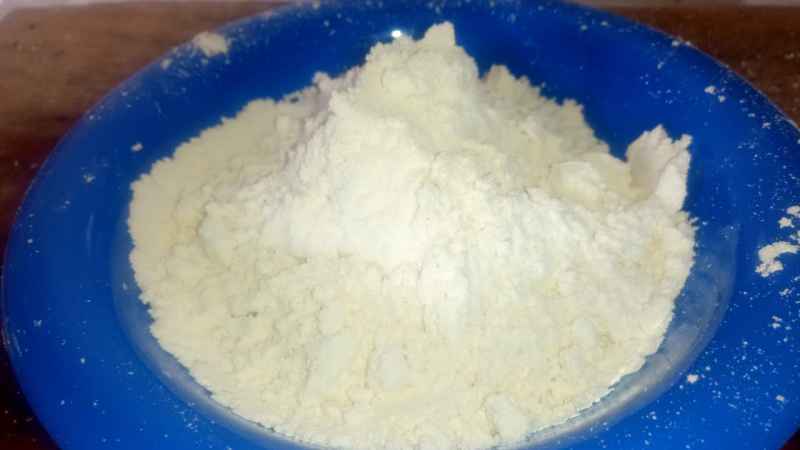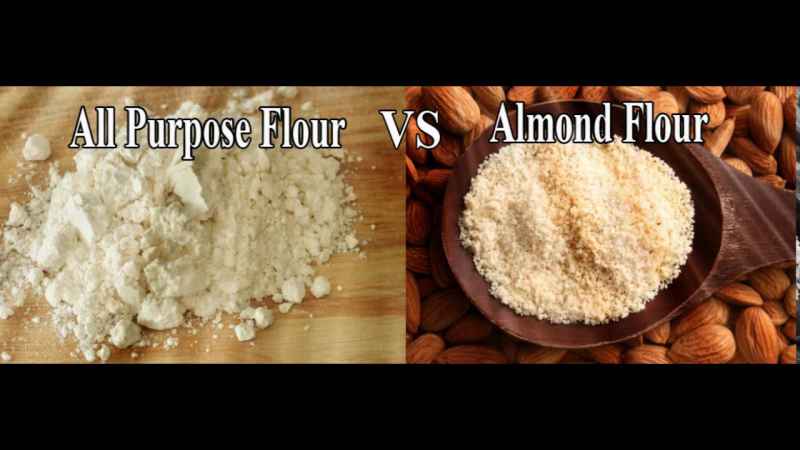Welcome to this article, blanched Almond Flour VS All Purpose Flour Carbs Nutrition Health Protein baking taste for cookies macarons.
Flour is a powder ground that is made from grain and it is the main ingredient to make cakes, pastries, cookies, and a lot of desserts. There are many types of grains that produce flour such as wheat, almond, barley, corn, rice, lima beans, all-purpose flour, buckwheat, peanuts, soybeans, rye, oats, coconut, potatoes, etc.
These all flour can be used to make plenty of recipes and help to make a wonderful meal. Some grains of flour is only used for bread, cookies, and baked goods. It means that every flour has its particular uses and you can make different dishes individually.
All flours are wonderful but today we are going to discuss almond flour and all-purpose flour. People want to know what is almond and all-purpose flour. What are the uses of these flours? Hence, we decided to discuss Almond Flour Vs All-Purpose Flour.
Table of Contents
Almond Flour

The flour is made with almonds that are produced by applying the grinding procedure. It is a gluten-free nut flour that is made from ground-blanched almonds. It can be used to make pastries, baking goods, and some other tasty meals.
Almond flour is a fantastic substitute for wheat flour because it can alternate wheat flour with a sweet taste, coarser texture, and amazing nutrients.
Almond flour has plenty of nutrients such as vitamin E, calcium, monounsaturated fats, magnesium, and potassium. It is the perfect ingredient for those people who love low-carb meals.
Moreover, almond provides protein, fiber, fats, copper, phosphorus, and vitamin B2, to the human body. Hence, almonds can help to manage blood pressure levels and help to control the blood sugar level in the human body. Almonds may help to lower cholesterol levels in patients and are also very effective for weight loss.
Easy Recipe Of Almond Flour
If you know how to make almond flour at home, then it is amazing for you. You can make it in your kitchen and use it in several recipes. Also, no need to buy almond flour from the market. Here is a fantastic recipe to make Almond flour that is easy though.
To make Almond flour in your kitchen, you will just require just two ingredients, which are as follows:
- Almond
- Blender
So, you can take a blender and have to add blanched almonds, and blitz it until all almonds shift into powdered flour. Whereas, you need to be careful not to go anywhere while blending because blanched almonds will shift into butter instead of flour.
You have to use a watch and lend blanched almonds for a specific time 5-10 seconds are enough to make almond flour.
You need to shake the blender after 5,10 seconds and do it again for another 5-10 seconds.
Hence, you will get almond flour within just 5 minutes and the method is very simple, easy, and helpful.
When To Use Almond Flour?
It is an interesting question about when to use Almond flour. So, you can use almond flour to make cakes or patties, and cookies, and also you can replace almond flour with bread crumbs to fry fish, chicken, and beef. You have some other recipes to enjoy almond flour such as:
- You can use Almond flour to make Vegan gluten-free waffles.
- You can make chocolate chip cookies with almond flour that will be gluten-free.
- Hence, Gluten-free carrot cake can also be made with almond flour.
All-Purpose Flour

All-purpose flour is made with hard and soft wheat. The endosperm process is applied to make this flour. It’s mild-flavor makes the recipes delicious, amazing, and wonderful. It can be used to make brownies, layer cakes, pie crusts, muffins, chocolate chip cookies, quick bread, etc.
All-purpose flour is a rich source of nutrients such as niacin, selenium, riboflavin, thiamin, etc. Moreover, all-purpose flour is sugar-free, cholesterol-free, sodium-free, low-fat, and also a good source of fiber.
It has a large number of calories, fiber, protein, carbs, Sodium, Carbohydrates, fat, etc. All-purpose flour is better than many other flours because of its taste, nutrients, and texture.
Almond Flour Vs All Purpose Flour

Let’s discuss the clear difference between Almond flour and All-purpose flour.
Gluten Content: A key dissimilarity between All-Purpose and almond flour is the existence of gluten. It means that almond flour is a gluten-free flour whereas all-purpose flour is rich in gluten and also has a rich amount of proteins.
Almond flour has no protein and it is a famous flour alternative for gluten-intolerant bakers who ought to skip the proteins from their diets for health causes.
Fat Content: Almond flour has a high amount of fat whereas All-Purpose flour is low in fat. Hence, you cannot add much moisture to all-purpose flour to bake goods. Whereas, you can add almond flour for extra moisture to your recipes and get the result in rich, thick, or greasy-feeling baked goods.
Flavor: All-Purpose flour has a mild flavor whereas almond flour has a sweet flavor. Hence, you can choose both flours by their tastes like you can use all-purpose flour to make the background in cake, bread, and cookie recipes, etc. Whereas, almond flour has a more powerful nuttier, sweet flavor to make pastries, cakes, and cookies.
Shelf life: During the milling procedure for All-Purpose flour, factories divide two wheat grain ingredients—bran and embryo—from the endosperm, terminating oils that promote spoilage and creating it better shelf-stable than additional flours.
Thus, All-Purpose flour can stay six to eight months on the frame or up to a year in the fridge. Whereas, almond flour manages to have a much briefer shelf life than traditional flour—a few months on the shelf or up to six months in the fridge.
Alternates For Almond Flour And All-Purpose Flour Conversion
Almond flour and All-purpose flour can’t be alternated with each other because of their differences. Thus, we have to discuss their substitutes individually.
Substitutes For Almond Flour:
Almond flour has the best substitutes which replace it well, such as:
Coconut Flour:
It is numerous familiar replacement for Almond flour and you can easily replace it. The amounts of almond flour and coconut flour might be changed because of some reason.
Hence, only a cup of almond flour is enough and you can replace it with ⅓ coconut flour. Moreover, you might need eggs with coconut flour to get the same texture. Whereas, coconut flour can be baked at the same temperature as you set for almond flour.
Wheat Flour:
It is another substitute for almond flour. Wheat flour has more elevated fat than almonds, and you can use wheat flour more than almond flour in your recipes.
During baking goods, you can replace the almond flour and use wheat flour in a 1:1 ratio. Whereas, you can skip the eggs from your recipe and enjoy this substitution.
Substitutes For All-Purpose Flour:
Buckwheat Flour:
This flour is nutty-flavored flour and it can be counted similarly to all-purpose flour. This flour is rich in fiber, vitamins, and other nutrients. You need to try to ratio 1:1 of buckwheat flour when you are baking because it will be enough.
It is a healthy flour and helps to make delicious food. Buckwheat flour is very healthy and nutritious and can better replace all-purpose flour.
Oat Flour:
This flour is also a great substitute for all-purpose flour because it is also Gluten-free. It is a very useful flour instead of all-purpose flour and is made from oat groats.
Oat flour has a high fiber and its sweet flavor helps to make delicious meals. You have a wonderful chance to use Oat flour rather than all-purpose flour bread, pancakes, and other pastries.
White Whole Wheat Flour:
You can replace the all-purpose flour with white whole wheat flour because they have equal nutrition and it’s distinctive for baking. You have to use the 1:2 ratio of white wheat flour while replacing the all-purpose flour when baking goods.
Rye Flour:
It is the best substitute for all-purpose flour because of its amazing fruity flavor. The color of Rye flour can be light, medium, white, dark, or whole.
Frequently Asked Questions
Can I Use Almond Flour Rather Than Corn Flour?
No, you can’t replace almond flour with cornstarch or cornflour because they have a completely different way in recipes. You can replace almond flour with nut flour such as coconut flour, pecan, or walnut flour.
Is All-Purpose Flour Bad Or Unhealthy For You?
It is not good for your Gut health and sometimes it is considered unhealthy for you because of its sticky essence. All-purpose flour may attach to the path of your digestive system. Similarly, all-purpose flour may cause high blood pressure.
Can I Substitute Almond Flour For All-Purpose Flour?
No, you can’t replace almond flour with all-purpose flour because both are different in taste/flavor, nutrients, and texture. Almond flour and all-purpose flour have totally different recipes and health benefits, and you can not use a similar amount of both flour in your recipes.
Conclusion
You have an amazing chance to learn about Almond Flour and All-Purpose Flour. You can know which flour is best for baking goods and which is helpful for your health. In Almond Flour Vs All Purpose Flour, we find that Almond flour is better than All-purpose flour.
Because Almond flour has healthy nutrients, and vitamins, that are beneficial for health. Whereas All-purpose flour is rich in protein and also not good for health.
You can use less amount of All-purpose flour rather than almond flour when baking. The clear difference is explained well and you can choose the best flour after reading this article.


